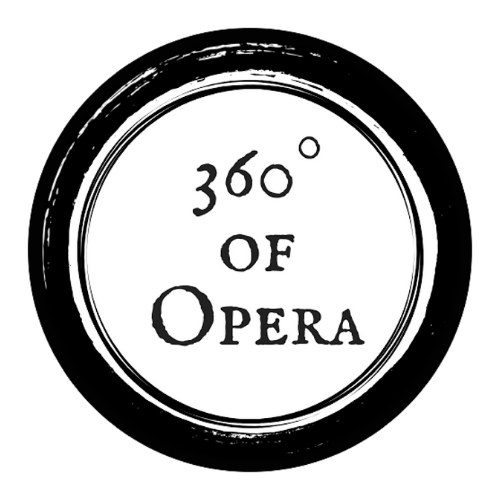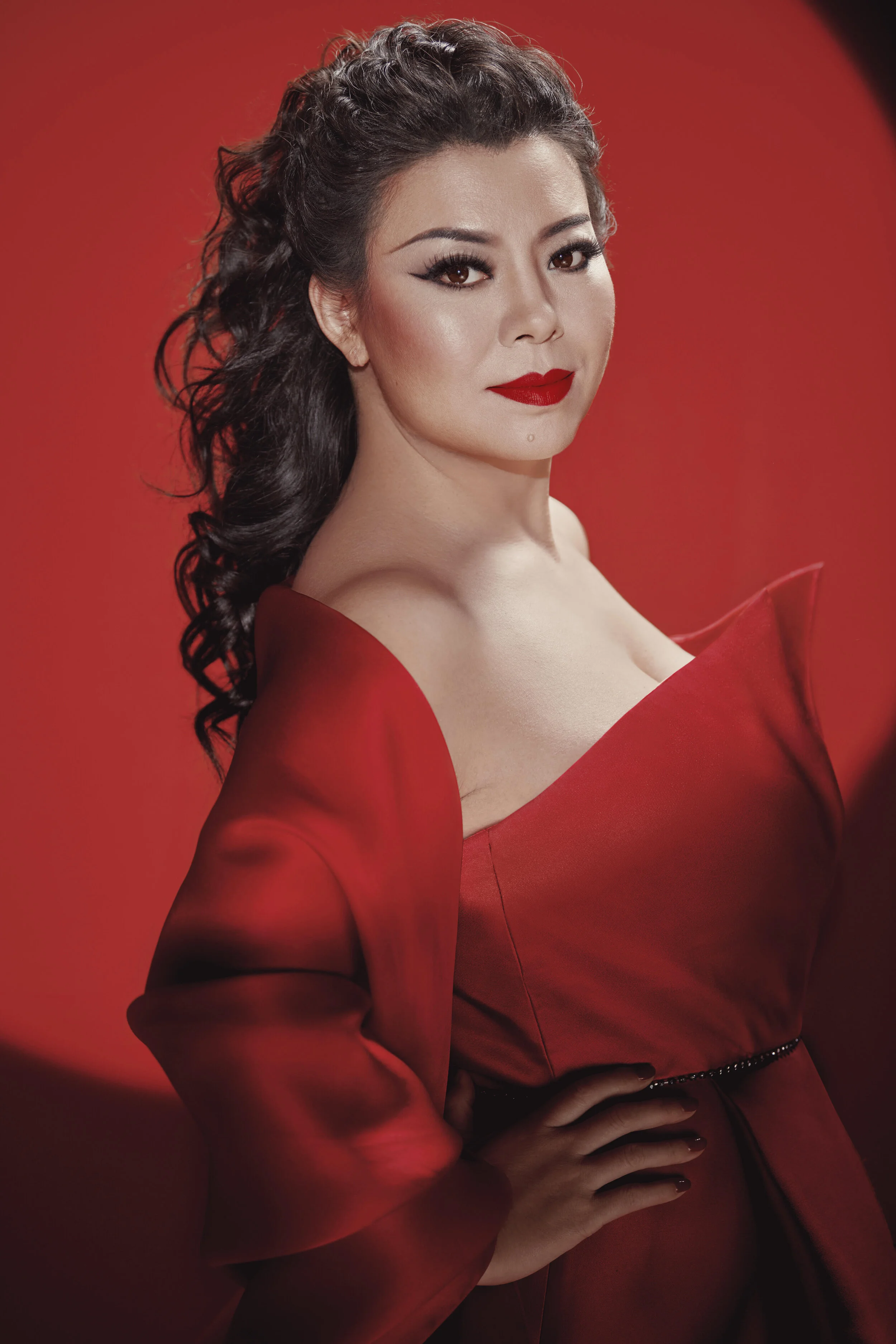Vissi d’Arte
A #360ofOpera interview with Hui He 和慧, written by Yutong Yang.
If only the world ran as smoothly and sweetly as an exquisite lyric soprano voice, no one would have to push.
But alas, reality — at least operatic reality — tends to be far more cacophonous. Murders, coups, liaisons … riveting, larger-than-life events populate the masterpieces of Verdi, Puccini, and the verismo tradition. Jealousy, rage, and ardor run wild.
And when push comes to shove onstage, it takes a clear but powerful lirico-spinto soprano voice to go all the way, sailing over the Romantic orchestra, and driving it right through the heart of that deceitful, tyrannical villain.
Chinese lirico-spinto soprano Hui He 和慧 is one such formidable lady of irresistible charm. Diva He, the “best Butterfly you could wish for” (Wiener Zeitung), and the “reference interpreter of [Aida]” (L’Opera), has enchanted and conquered the audience at most of the world’s leading theaters, with her “warm voice … beautiful technique and … intensity” (Le Monde).
Before she mounts the stage again as Tosca at Staatsoper Hamburg, where she’ll celebrate her 100th performance of this pious, passionate leading lady on October 2, we had the great honor of chatting with her about her exciting career and artistic philosophy, with a special focus on her latest Cavalleria Rusticana and Pagliacci performances at Shanghai Opera House.
1. Your inspiring artistic journey has taken you to some of the best opera houses and concert halls in the world. We’re so proud of you!
I consider myself a really lucky person, because I have opportunities to sing in some of the biggest opera houses all around the world as a Chinese artist. I’m proud of what I’ve achieved until now, because I was brave enough to embark on this journey in the opera world that is really far from my Chinese roots. I’ve sung roles like Tosca and Adriana Lecouvreur that are very Western characters, in opera houses like La Scala, Arena di Verona, Teatro Regio di Parma, Wiener Staatsoper, and at the Salzburg Festival! It’s really incredible!
2. How do you feel performing back in China?
When I come back to China to sing there, I feel like an ambassador of Italian opera and of the operatic culture in general.
3. Please tell us something about the Chinese audience nowadays. What’s it like singing for them?
They’re really interested in classical music and opera. The most exciting thing is that in China, the audience is very young, but they’re passionate and demanding, so I want to always give my best.
4. How has the Chinese industry evolved throughout the years?
I’ve witnessed the development of an operatic culture in my country: we’ve built hundreds of theatres and concert halls, designed by the best architects and engineers, with the best acoustic systems. Now, nearly every city has its own theatre or concert hall, and they curate wonderful seasons, bringing some of the best directors, conductors, and artists to China. There are surely areas to improve upon, and things to learn from the history of the opera business and “artisanship,” but I think we’re doing a great job in making opera really accessible to everyone.
5. Why did the Shanghai Opera House choose to stage these two verismo operas together?
Cavalleria Rusticana and Pagliacci are traditionally combined together for their musical, topical, and stylistic similarities. The roles of Santuzza and Nedda, however, are in reality very different.
6. What was it like playing them one after the other? Please tell us a bit about these latest additions to your impressive repertoire.
For a singer, it’s really a challenge to embody Santuzza and Nedda in the same evening. Santuzza is a desperate woman, who lost her lover Turiddu when he cheated on her with his ex-girlfriend Lola. She also lost her social standing, and became a pariah. Nedda is young, fragile, and superficial. She is frustrated, and feels like a bird in a cage, imprisoned in a toxic relationship with her husband Canio, a violent, jealous man. I think he doesn’t really love her, but loves to be possessive. So, when she meets Silvio, a charming young man, she falls in love with the possibility of finally being happy and free.
7. What made your performances at the Shanghai Opera House unique?
This production in Shanghai had to be a semi-staged version due to COVID-19 measures, but we didn’t make any adjustments on the dramaturgy or the score. The beauty of Cavalleria and Pagliacci lies in the intimate relationships, so it’s possible to stage them this way. This show was unique for me because I made my operatic début as Aida in this theatre, and every time I come back, I’m really excited and nostalgic. The evening was not only my role début as Nedda, but also my coming back to Santuzza after having played this role only once, 22 years ago on the same stage! Incredible! I hope to sing Santuzza and Nedda more frequently, I love these women!
8. Rumor has it you designed your own dresses for this production. What were your inspirations?
Yes, for this production I created all the looks for my characters: Santuzza was easy, I used a dress of mine, but I wanted the makeup and wig to be in the style of the 40s. For Nedda I designed a dress that suited my idea of the character: I thought of the world of street artists — such as Canio’s company — nomadic artists, with an almost gypsy lifestyle. For this reason, the costume is very close to the style of the Spanish gypsies, in whose lives passions and tragedies are intertwined as for Nedda. The flounces in the skirt and in the upper part represent the unfortunate woman’s romanticism, fantasy, and desire for freedom.
9. Many of the gowns you’ve donned are the stuff of dreams for womxn singers. How do beautiful costumes that match the identity / character of the roles help singers perform well? Who are some of your favorite designers?
For a singer, having beautiful costumes is very important, because it really helps you create the character on stage. When you feel beautiful, you are more secure and confident in your role.
10. Who are some of your favorite designers?
I remember the beautiful costumes of Tosca by Hugo de Ana at the Arena di Verona, and the costumes of Madama Butterfly at the Teatro Real de Madrid by the Oscar winner Franca Squarciapino, and again at the Arena by the Oscar winner Emi Wada. I’d already designed some gowns for my concerts, and in the past few years I’ve fallen in love with the design of Roland Nivelais … he created some dream gowns for me!
11. You seem to be broadening your artistic horizons all the time!
I think that as artists we have a special sensibility for beauty … we work with set designers, painters, and costume designers, who help us live in an artwork onstage. For two years I’ve been seriously working on my painting skills, a passion that I’ve always had, and rediscovered during the pandemic. I’ve made an exhibition for World Art Dubai.
12. The pandemic brought many shows and careers to a standstill. Can you tell us a bit about your experience, how you’ve been perfecting your artistry during this time?
The pandemic stopped our lives and shattered our plans. It taught us that we are not almighty. We’d never thought that our lives could change overnight, but it’s happened, and I think that the best thing has been getting the best part of it and taking advantage of it. The first period was so painful, reading all the terrible news and thinking of who was suffering, and all the doctors and nurses that were fighting for us. At one point I started to paint, to vent with the colors all my negative thoughts. In the first period, it was also difficult to sing; I honestly wasn’t in the mood to study. But at a certain point, I came to understand that singing is a part of me, and I started to study to improve myself and also approached new roles and new music. I studied Norma and Alzira, and on Sunday with some friends all around the world, we’d hold private concerts on Zoom, where we sang and gave some advice to each other.
13. Has the meaning of art changed for you in any way?
My conception of art has not changed: I think that without art you can survive, but surviving is not really living life! Art is life, love, passion, communication, and expression of oneself. Music — opera — is a language without boundaries. It can offer solace, hope, and comprehension: I always say that the first time I heard Puccini’s La Bohème I didn't even understand one word but I started to cry … This is art! It’s emotive communication … the most powerful instrument. That’s why I want to encourage aspiring students and singers to keep studying and improving themselves, because art, besides being a difficult business, is principally a soul nourishment.
Splendid voice and regal gowns aside, Diva He is an endearingly down-to-earth person, who enjoys cooking for her friends and picking up new hobbies. Her 2018 recital in Shenzhen, China, marking the 20th anniversary of her international career, inspired me to pursue opera with her touching sincerity throughout, from a poetic Chinese art song to the final encore of “Vissi d’arte.” She put her heart and soul into the entire concert, and the torrent of raw emotions swept every one of us in the concert hall that night off our feet.
Diva He is always pushing for more. She’s left dozens of legacies in her wake, yet she doesn’t dwell on them. Instead, she takes on every challenge with renewed zeal and gusto, adapting, exploring her truth through art, and paving the way for fellow WOC in the opera world. Blue’s her favorite color, and she’s flowing ever onwards like a merry, untiring stream, embracing new landmarks with curiosity and joy.
Written by Yutong Yang
Photography by Yunlong Jia






